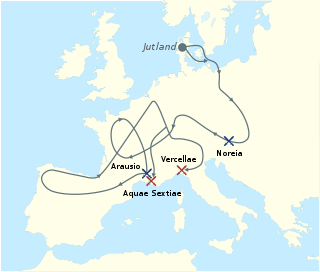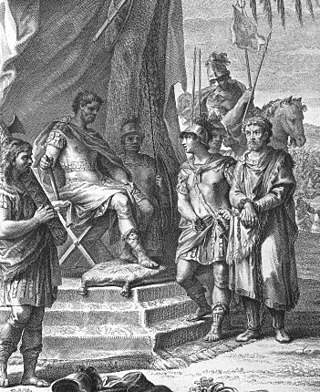80s BC is the time period from 89 BC – 80 BC.
Year 90 BC was a year of the pre-Julian Roman calendar. At the time it was known as the Year of the Consulship of Caesar and Lupus and the Third Year of Zhenghe. The denomination 90 BC for this year has been used since the early medieval period, when the Anno Domini calendar era became the prevalent method in Europe for naming years.
Publius Rutilius Rufus was a Roman statesman, soldier, orator and historian of the Rutilia gens, as well as a great-uncle of Gaius Julius Caesar. He achieved the highest political office in the Roman Republic when he was elected consul in 105 BC.

The Battle of Arausio took place on 6 October 105 BC, at a site between the town of Arausio, now Orange, Vaucluse, and the Rhône river. Two Roman armies, commanded by proconsul Quintus Servilius Caepio and consul Gnaeus Mallius Maximus, clashed with the migratory tribes of the Cimbri under Boiorix and the Teutons under Teutobod.

This is a historical timeline of Portugal.

The Battle of the Muthul was fought at the Muthul River in Numidia in 109 BC. The Numidians, led by their king Jugurtha, fought a Roman army commanded by the consul Quintus Caecilius Metellus Numidicus. The battle was fought during the Jugurthine War, a war between King Jugurtha of Numidia and the Roman Republic. The battle was indecisive - it took the Romans four more years to defeat Jugurtha who was captured by Lucius Cornelius Sulla in 105 and executed during Marius' Triumphal parade a year later (104). The Roman historian Publius Rutilius Rufus distinguished himself during the battle, while Gaius Marius' military genius shone through for the first time, saving the day for the Romans.
Lucius Julius Caesar was a Roman statesman and general of the late 2nd and early 1st centuries BC. He was involved in the downfall of the plebeian tribune Lucius Appuleius Saturninus in 100 BC. He was consul of the Roman Republic in 90 BC during the Social War. During the war he commanded several Roman legions against the Italian Allies. He was awarded a Triumph for his victories on the Samnites at Acerrae.
Publius Rutilius Lupus was a consul of the Roman Republic in 90 BC. He led a campaign against the Marsi during the Social War, ultimately resulting in his death at the unsuccessful Battle of the Tolenus River.
Quintus Servilius Caepio was a Roman patrician, statesman and soldier. He was the son of Quintus Servilius Caepio who was consul in 106 BC and who lost his army during the Battle of Arausio. He was elected praetor some time in the last 90s BC and fought for Rome during the Social War. He was killed in the second year of the war while fighting the Marsi by Quintus Poppaedius Silo.

Lucius Cornelius Scipio Asiaticus was a great-grandson of Lucius Cornelius Scipio Asiaticus, consul in 190 BC, who was victor of the Battle of Magnesia.
This section of the timeline of Hispania concerns Spanish and Portuguese history events from the Carthaginian conquests to before the barbarian invasions.

The Battle of Burdigala was a battle of the Cimbrian War that occurred in the year 107 BC. The battle was fought between a combined Germanic-Celtic army including the Helvetian Tigurini under the command of Divico, and the forces of the Roman Republic under the command of Lucius Cassius Longinus, Lucius Caesoninus, and Gaius Popillius Laenas. Longinus and Caesoninus were killed in the action and the battle resulted in a victory for the combined tribes.
The gens Rutilia was a plebeian family at ancient Rome. Members of this gens appear in history beginning in the second century BC. The first to obtain the consulship was Publius Rutilius Rufus in 105 BC.
Lucius Licinius Lucullus was a politician and a general of the Roman Republic. He was the eldest son of Lucius Licinius Lucullus, the consul of 151 BC. He, however, did not achieve the political success of his father and failed to hold the consulship, reaching only the position of praetor in 104 BC. During his praetorship he first successfully put down the Vettian Revolt, a minor slave revolt in Campania, before being sent to take command in Sicily during the Second Servile War. He was later relieved of his command and prosecuted for embezzlement upon his recall to Rome. Being convicted, he was banished from the city and lived the remainder of his life in exile. He is the father of the more famous Lucius Licinius Lucullus, who defeated Mithridates and Tigranes in the Third Mithridatic War.
Titus Vettius Scato was an Italian rebel commander, a general of the Marsi during the Social War. At the Battle of the Tolenus River, Scato and the Marsi ambushed the Roman consul, Publius Rutilius Lupus after the Romans crossed the River Tolenus. Unfortunately for Scato, Rutilius's senior legate, Gaius Marius, and his division were operating separately from Rutilis and crossed the river downstream of the battle, captured the Marsi camp, and then attacked the Marsi while they were still fighting Rutilius's army, routing them with heavy losses. He defeated Lucius Julius Caesar in battle before marching on and capturing Aesernia. When he encountered an army under Pompey Strabo, instead of fighting, the two met, their armies treating each other without hatred. According to Seneca, he was captured by the Romans but was stabbed to death by his slave rather than face the ignominy of defeat.
The Battle of Aesernia took place in the year 90 BC during the Social War. A force under the consul Lucius Julius Caesar, an uncle of the more famous Julius Caesar, was engaged while moving to relieve the siege of Aesernia and defeated by a rebel force under Titus Vettius Scato. Orosius wrote that Caesar had to entirely rebuild his army with Gallic and African troops after the battle while Appian admits only 2,000 Roman dead. As a result of their victory the rebels had enough spare forces to reinforce the army besieging Aesernia while another army took Venafrum. It is also possible Venafrum joined the rebels.
The siege of Zama, part of the Jugurthine War, was an investment of the Numidian town of Zama by a Roman army. The Romans were commanded by Quintus Caecilius Metellus, one of the consuls of 109 BC, while the Numidians were under the overall command of Jugurtha, the king of Numidia. The Romans' main objective was to lure Jugurtha into a set-piece battle; the Numidians had been wearing down the Roman legions by guerilla warfare and the Roman commander hoped the siege would pressure the Numidian king into giving battle. Jugurtha did not let himself be goaded into a pitched battle and kept up his opportune attacks while the defenders of Zama kept the Romans at bay. Failing to take the city and failing to provoke the Numidian king into entering a set-piece battle, the Romans gave up on the siege and marched back to the Roman province of Africa.




